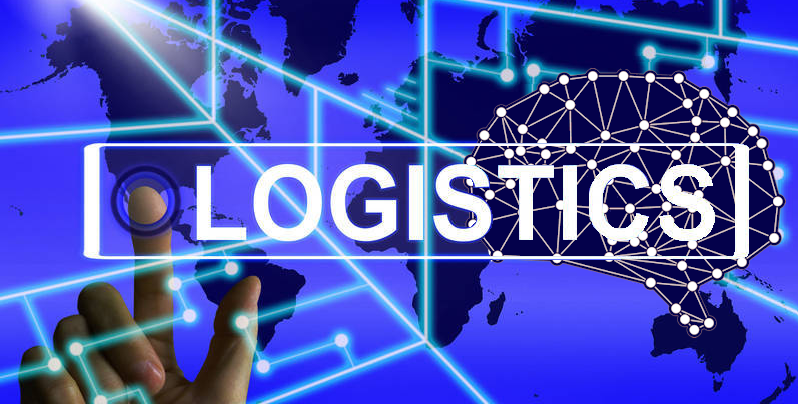Logistics can be traced back to the earliest repeated exchange of resources and goods between tribes and villages. One of the longest and most important historical trade routes was defined by the movement of silk out of China. As the staff at Hopkins Distribution Company observes, “Today, logistics and distribution is a rather complicated and advanced process but it began years ago in a less advanced form. … Logistics refers the movement of products or services to a designated location at an agreed upon time, cost and condition.”[1] They go on to note, “Rome developed a highly efficient logistic system to supply its legions. Military officers called ‘logistikas’ were responsible for ensuring the supply and allocation of resources, so that soldiers could move forward efficiently.” Efficiency has historically been a primary focus of logistical operations. Logisticians always look for the most efficient and cost-effective way to move resources and goods — be it by land, sea, or, more recently, air. In large measure, human progress advanced along with infrastructure improvements associated with logistics — from road systems to ports to airfields.
It should also be pointed out that recordkeeping has been an essential part of the logistics picture since the beginning of recorded history. So, it should come as no surprise that, in the Digital Era, information technology has become a critical part of today’s logistics infrastructure. And, as digital supply chains generate more and more data, businesses recognize they need cognitive technologies (aka artificial intelligence) to make sense of all that data. At a recent conference, Feroz Khan (@feroztechie), a Digital Advisory Partner at KPMG, stated, “Smart logistics powered with Artificial Intelligence will redefine the supply chain excellence. … Technology is disrupting the logistics sector and with artificial intelligence being a significant part of day-to-day functioning, it is going to transform the industry.”[2] The Economist adds, “AI is making companies swifter, cleverer and leaner.”[3]
AI in the Supply Chain
Supply chain journalist Robert J. Bowman notes, “Artificial intelligence … has become omnipresent in the world of logistics management.”[4] The Economist reports, “Integrating AI into the complex web of production and distribution — the supply chain — will have a bigger economic impact than any other application of the technology and affect a larger number of businesses, says Sudhir Jha of Infosys, a large IT company. McKinsey estimates that firms will derive between $1.3trn and $2trn a year in economic value from using AI in supply chains and manufacturing.” This value is created in a number of ways, including:
• Optimizing routing. The Economist reports, “Delivering 25 packages by lorry or van might seem straightforward enough, but it is devilishly complex. The number of possible routes adds up to around 15 septillion (trillion trillion), according to Goldman Sachs, an investment bank.” AI can analyze those routes and lay out the most efficient ones — saving both time and money.
• Tracking materials, products, and assets. Bowman notes, “Today, the technology can track the origin and provenance of all the raw materials and components that go into something like a smartphone, while helping to direct the flow of product all the way to the end customer.” The same technologies that can trace materials and components can help companies track their other assets as well.
• Controlling smart factories and warehouses. Naveen Joshi (@joshinav), Founder and CEO of Allerin, explains, “Smart equipment like management systems for warehouses, pallets, robotic transport and containers act as a pillar to automated supply chains and help extract and create a greater value from each piece of equipment. Data readers, smart shelves and autonomous vehicles are some of the smart types of equipment that help workers. Artificial Intelligence is another pillar of Logistics 4.0 that helps achieve highly efficient supply chains. Logistics 4.0 uses shipments, supplies, and orders that are prepared and packed depending on the sales forecasts predicted by the use of big data and machine learning.”[5]
• Providing insights. According to Bowman, “AI today is necessary in order to make sense of the massive amounts of data generated by both e-commerce and traditional retailers — far too much for humans to parse and analyze.”
• Improving financial operations. The Economist reports, “AI will make routine back-office work more efficient, says Morag Watson, BP’s chief digital-innovation officer. Some early adopters are starting to use AI to scan invoices and predict payments.”
• Making better predictions. One oft-touted benefit of AI is its ability to predict when equipment might fail. The Economist explains, “Companies can combine data on past performance with those generated by smart sensors on machinery (part of the much-hyped ‘internet of things’) to predict when a jet engine or a wind turbine is likely to fail, so they can do maintenance before that happens.” AI can also be used to make better predictions about demand, transit times, etc. Derek Gittoes, Vice President of Supply Chain Management Product Strategy at Oracle, explains, “Accurate transit time predictions have become more crucial than ever given customer demands and expectations, the cost impacts of late shipments, and dynamic nature of today’s supply chains. Machine learning (ML) techniques can be applied to provide more accurate transit information and estimated arrival times (ETAs) by analyzing the historical shipment data in your transportation management systems. Moreover, these ML-based transit time predictions can feed into shipment planning and execution processes to provide better decision-making that ultimately yields better customer service and cost performance.”[6]
As the above discussion discloses, cognitive technologies aren’t the only cutting-edge technologies being implemented in the logistics sector. Joshi explains, “The manufacturing and logistics industry is integrating its ecosystem with cutting-edge new technologies like the use of IoT in supply chain management. Automation and AI, robotics, language process and lean manufacturing are experiencing a drastic and swift change in technologies that control and support them.” He also notes that GPS technology is playing an essential role in logistics operations.
Concluding Thoughts
Logistics is one of society’s most important functions. Efforts to make logistics operations more effective and efficient will continue as new technologies emerge. Not surprisingly, Murray Thom, Vice President of product management at the quantum computing firm D-Wave System, Inc., believes quantum computing will be one of the technologies that will dramatically improve logistics operations. He notes, “Forward-looking organizations are increasingly embracing new technologies to navigate the ever-challenging business environment and stay competitive. … Quantum computing is emerging as an important means of helping companies solve their most complex business challenges.”[7] He concludes, “Forward-thinking manufacturing, logistics and mobility businesses can secure a first-mover advantage today by beginning to explore specific problems that can benefit from quantum computing. In combination with classical computing, there are limitless possibilities as to what businesses can achieve with quantum technology in all areas of supply chain management. From scheduling to routing to bin packing, there are many potential areas that quantum computing could revolutionize. It’s up to businesses to take advantage of this promising technology before others catch up.”
The important thing to remember is that there are no silver bullet solutions to complex logistics challenges. Logistics providers need to explore every emerging technology to see if those technologies can make their operations more effective and efficient. The world depends on it.
Footnotes
[1] Staff, “History of Logistics, Distribution and Supply Chain Management,” Hopkins Distribution Company, 11 December 2020.
[2] Staff, “AI And Smart Analytics Will Redefine The Future Of Logistics Supply Chain,” FerozTech, 23 February 2022.
[3] Staff, “How AI is spreading throughout the supply chain,” The Economist, 28 March 2018.
[4] Robert J. Bowman, “Watch: How Is Artificial Intelligence Being Applied to Logistics?” SupplyChainBrain, 12 August 2021.
[5] Naveen Joshi, “Logistics 5.0: The Final Piece In The Supply Chain Optimization Puzzle?” Forbes, 26 March 2022.
[6] Derek Gittoes, “Predictability in a Time of Uncertainty: Machine Learning in Logistics,” Logistics Viewpoints, 21 January 2021.
[7] Murray Thom, “Quantum Computing Is Solving the World’s Complex Logistics Problems,” SupplyChainBrain, 21 July 2022.





